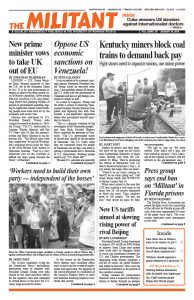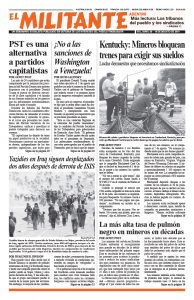“It’s become clear that the fight’s not over,” David Gibson said in a video posted to Facebook Aug. 6. Gibson is one of the owners of a family-run bakery in Oberlin, Ohio, who won a lawsuit in June against Oberlin College and Meredith Raimondo, its vice president and dean of students, for slandering the Gibsons as “racist,” intentionally and maliciously damaging the small business.
“Recent public statements from Oberlin College make it clear that the college is refusing to accept the jury’s decision,” Gibson said.
Lawyers for Oberlin College have until Aug. 19 to submit post trial motions to Judge John Miraldi, who has said he will rule on them by Sept. 9. Post trial motions can be used to request a retrial or overturn or modify a verdict.
In the Aug. 6 video Gibson reported that he had been diagnosed with pancreatic cancer. The school administrators knew about the diagnosis since February and the college’s lawyers filed a motion to prevent any mention of it during the trial. “We agreed because I wanted the jury to decide this case on the facts alone. Nothing else,” Gibson explained.
Less than a day after the June 13 jury verdict that found the college guilty, its president, Carmen Twillie Ambar, stated, “This is not the final outcome.”
“They’re sending a clear message to me and to my 91-year-old dad that they will just wait us out,” Gibson said.
The school says it intends to appeal the verdict and multimillion-dollar judgment against it, a process that could take years.
Judge Miraldi required the school, which admits it is in dire financial straits, to post a $36 million bond — covering $25 million in damages, $6.5 million in lawyers fees plus three years interest — before allowing a stay of execution on the court’s judgment.
A Militant headline last week incorrectly stated that the college paid the bond. But the college only posted a bond with the court, a guarantee that the institution will pay the Gibsons the multimillion-dollar judgment if it is not overturned at the end of the appeals process. The college secured the bond through a major insurance company which has agreed to pay the judgment if for any reason the college does not.
The Gibsons brought the lawsuit against the college after its officials orchestrated protests outside the bakery, claiming that the Gibsons had a long history of racial profiling, and pursued a boycott campaign to damage the small business.
The protests took place after three college students who are Black were charged after trying to shoplift from Gibson’s. They all pled guilty to misdemeanor charges and stated that no element of racism was involved in the Gibsons’ actions.
Instead of issuing a statement to say the Gibsons were not racist, as the bakery owners asked, college officials demanded that the small business owners refuse to call the cops the first time a student shoplifts from their store and just report the theft to the college. Attitudes of class privilege and entitlement drove college officials in their dealing with the small business owners. They underestimated the widespread support the Gibsons would win from working people in the region as they stood up to the college’s smear campaign.

